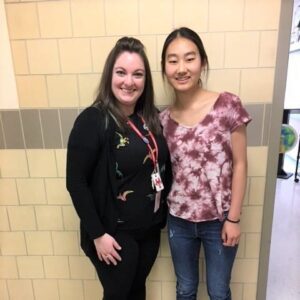For Immediate Release
Wednesday, April 25, 2018
12:00 p.m. U.S. Eastern Time
Media Contact:
Nalini Padmanabhan
ASHG Director of Communications & Marketing
301.634.7346
press@ashg.org
Contest Asked High School Students: How Should People Engage with Direct-to-Consumer Genetic Testing?

(courtesy Ms. Peborde)
BETHESDA, MD – As part of its celebration of National DNA Day, the American Society of Human Genetics (ASHG) announced today the winners of its 2018 DNA Day Essay Contest, which encourages high school students and teachers worldwide to learn about human genetics concepts and apply them to current scientific and societal issues. ASHG awarded first place to Diane Zhang, a junior at Fox Lane High School in Bedford, N.Y.; second place to Ilan Bocia, a senior at YULA-Boys in Los Angeles, Calif.; and third place to Nadia O’Hara, a freshman at Pechersk School International in Kyiv, Ukraine.
ASHG received essays from more than a thousand students from 43 U.S. states and 23 countries who explored how genetics is informing, shaping and changing our lives, after which more than 350 ASHG members evaluated the results for accuracy, creativity and writing. Since 2006, the Society has led the contest annually and seeks to spark excitement and learning among the next generation of genetics professionals and foster greater genetic literacy among the general public.
This year students shared their views on whether medical professionals, such as medical geneticists or genetic counselors, should be required for all genetic testing, or if consumers should have direct access to predictive genetic testing. Students were asked to use at least one disorder as an example to illustrate and defend their answers.
“Direct-to-consumer genetic testing is increasingly a topic of public interest and conversation, and we were interested in science students’ views on the involvement of health professionals in working through the results of such tests,” said Jannine D. Cody, PhD, Professor of Pediatrics at the University of Texas Health Science Center at San Antonio, and Chair of ASHG’s Information & Education Committee. “The winning essays were thoughtful and nuanced, reflecting a variety of views and a sophisticated consideration of the issues, and we were pleased to see high-quality entries from several countries around the world,” she said.
National DNA Day, celebrated annually on April 25, commemorates the discovery of DNA’s double helix structure in 1953 and the completion of the Human Genome Project in 2003, two key milestones in genetics.
“Being involved in the judging process always makes me optimistic about the next generation of human genetics specialists,” said Dennis Drayna, PhD, Section and Laboratory Chief at the National Institute on Deafness and Other Communication Disorders, an ASHG member who has served as a judge of essay submissions since 2014. “The essays make it clear that evidence-based critical thinking is alive and well among today’s motivated and ambitious young people,” he said.
ASHG will award monetary prizes to winning students as well as grants for genetics laboratory equipment to eligible teachers. Zhang, whose essay argued that genetic counselors should not be required for all direct-to-consumer genetic tests, using breast cancer as an example, will receive a $1000 prize. Bocian, whose essay argued that medical professionals should be required for such tests, using Alzheimer’s disease and breast cancer as examples, will receive a $600 prize. O’Hara, whose essay argued that genetic counselors should be required for such tests, using Huntington’s Disease as an example, will receive a $400 prize.
Honorable mentions were awarded to 10 students, each of whom will receive a $100 monetary prize. The recipients of honorable mentions, listed alphabetically by last name, are:
- Blair Atherton, a home-schooled sophomore in Avon, Ill.
- Jaeho Hwang, a sophomore at Seoul International School in Seoul, South Korea
- Amy Seunghyun Kim, a junior at Korea International School, Jeju, in Seogwipo-si, South Korea
- Kenton Kryger, a senior at Battle Creek Area Math & Science Center in Battle Creek, Mich.
- Cindy Li, a senior at Smithtown High School East in St. James, N.Y.
- Manali Nayak, a senior at Dr. Ninad Sheode’s Physics Coaching Class in Pune, India
- Fiona Oh, a sophomore at Homestead High School in Cupertino, Calif.
- Sarah Weber, a junior at Albuquerque Academy in Albuquerque, N.M.
- Lena Wood, a freshman at Scarborough High School in Scarborough, Maine
- Camille Zywczyk, a sophomore at Palm Beach Central High School in Wellington, Fla.
For details on the 2018 contest winners, including photos and the winning essays, see: http://new.ashg.org/education/dnaday_winners_2018.shtml.
About the American Society of Human Genetics (ASHG)
Founded in 1948, the American Society of Human Genetics is the primary professional membership organization for human genetics specialists worldwide. Its nearly 8,000 members include researchers, academicians, clinicians, laboratory practice professionals, genetic counselors, nurses, and others with an interest in human genetics. The Society serves scientists, health professionals, and the public by providing forums to: (1) share research results through the ASHG Annual Meeting and in The American Journal of Human Genetics; (2) advance genetic research by advocating for research support; (3) educate current and future genetics professionals, health care providers, advocates, policymakers, educators, students, and the public about all aspects of human genetics; and (4) promote genetic services and support responsible social and scientific policies. For more information, visit: http://new.ashg.org.
9650 Rockville Pike | Bethesda, MD 20814 | 301.634.7300 | society@ashg.org | new.ashg.org
Connect with ASHG on Twitter (@GeneticsSociety) | Facebook | LinkedIn
